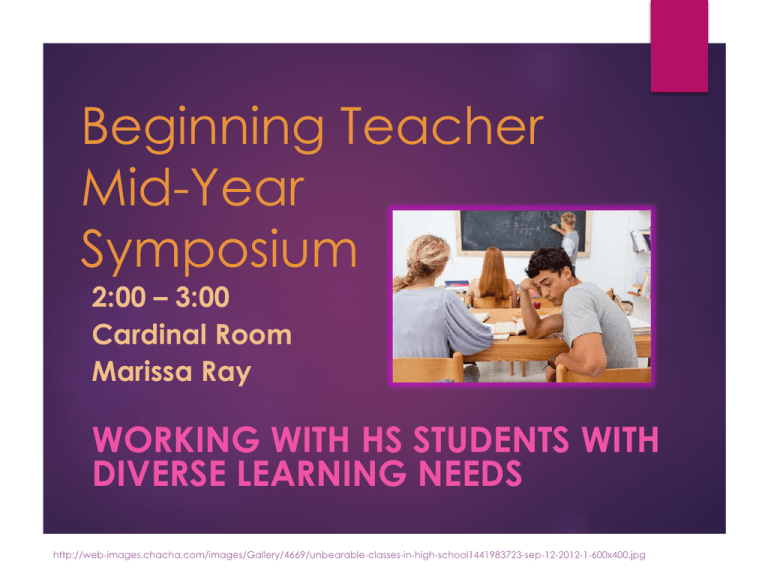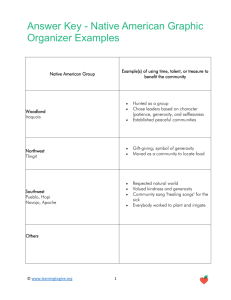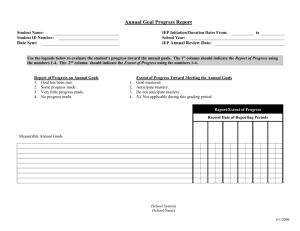Mid Year Symposium Presentation
advertisement

Beginning Teacher Mid-Year Symposium 2:00 – 3:00 Cardinal Room Marissa Ray WORKING WITH HS STUDENTS WITH DIVERSE LEARNING NEEDS Finding Solutions to Problems G I M B NATURAL Attachment Respect Love Achievement Creative Resilient Autonomy DISTORTED ABSENT Attention Seeking Alienated Gang Involvement Lonely Craves Approval Suspicious Overachiever Underachiever Cheating Gives Up Easily Perseverative Avoids Risks Rebellious Lacks Confidence Responsible Bullies/Victimizes Lacks Self-Control Independent Altruism Compassionate Understanding Hostile Aggressive Selfish Helping Overindulgent Self Abusing Irresponsible Narcissistic Anti-Social Psychopathic The Circle of Courage It is believed that… …all four parts of an individual's "circle" must be intact to have a selfsecure, prosocial approach to life. …a lack of strength in any of the four areas of development can result in emotional and behavioral difficulties. : http://firesidelearning.ning.com/forum/topics/motivating-students-beyond Internet Source~ http://www.behavioradvisor.com/CircleOfCourage.html The Four Spirits Belonging Mastery The most important component Those who are strong in the “Mastery” Upon which the other three are based feel competent in their abilities, Humans have a need to feel valued, important and protected by others... to feel comfortable and welcomed within a group seek more skills and knowledge, and are willing to fail or look unskilled when they try new things. family, friends, colleagues… Internet Source~ http://www.behavioradvisor.com/CircleOfCourage.html The Four Spirits Independence Persons with a strong sense of "Independence” in control of themselves, their behavior, and their lives. Generosity Generosity is built in groups where we belong; share time, work, play, resources and knowledge Those with a strong sense of “Generosity” are empathetic toward others receive pleasure from helping others in need. give of themselves or their possessions in some way feel have a well-developed sense of autonomy, and accept responsibility for themselves and their actions. Internet Source~ http://www.behavioradvisor.com/CircleOfCourage.html Cyrena Goodwin EC Teacher Pisgah High School 29 years experience Tiffany Hamm EC Teacher Pisgah HS 10 years experience Angela Lunsford Inclusion Science Teacher 24 years experience Seek out your Exceptional Children colleagues and related personnel for support Collaboratively match students to teachers so learning and methods align Establish administrative support for your programs & practices Work closely with your counseling office about schedule changes, etc. Work closely with Vocational Rehabilitation counselors for employment (OCS) and career choice (Career College) support Engage Community College Representatives to meet with seniors and discuss program options http://socialeffect.com.au/wp-content/uploads/2014/12/collaborationdef.jpg Requirements for Effective Collaboration Strong Relationships • Explore values, interact positively, communicate effectively, give & take Clear Goals • Establish early, identify subtasks, discuss progress, maintain focus Clear Roles • Establish responsibilities, be prepared, follow through, lead & support Effective Processes • Set and keep schedule, organize well, contribute equally, engage fully, meet deadlines Ongoing Assessment • Reflect consistently, seek & provide constructive feedback, build on prior teaching, plan next steps based on need Top Tips for Building Your Students’ Spirit of Belonging Build Your Relationship with Students • • • • • Be current and trendy Establish your reputation as an ally Be tolerant and build tolerance in students Be compassionate and build compassion Use 2 x 10 • Spend 2 minutes each day for 10 days building your relationship with your most challenging students Build Students’ Relationships with Peers • Courses of Study which Align with Goals • Engage them as managers for sports teams • Build Relationships with Families • Meet with EC students & families before school to prepare them to make informed HS course selections • Call to share positive reports • Accommodate family needs • Call before IEP meetings to determine best times Build Relationships in the Community • Occupational Course of Study • School and Community Based Employment • Job tours in local businesses • Job coaching / shadowing under employers / employees • Top Tips for Building Your Students’ Spirit of Mastery Support Student Success Through Your Preparations • • • IEP’s are not suggestions, not optional! They are legal requirements / responsibilities Read IEP’s to know modifications and accommodations Establish agenda routines and post schedule for the day • Put it on the board to avoid overwhelm • Check it off as you go • Have something for students to do when entering the classroom Support Student Success Through Effective Teaching Practice • • • • Present material in a number of ways • Model A LOT • Songs / Lyrics • Videos Guide practice multiple times before IP Use an assortment of activities • Tangible / Hands On tasks Give directions in multiple forms • Say them, write them, print them & explain Support Student Success Through Modified Assignments • Break projects into small parts • 10 page paper? NO! Don’t even say it! • Start small and build up! • Can’t have “no late work” policies • Always accept and grade late work • Modify Assignments / Tests • Reduce amount by alternate #ed items • Narrow answer choices • Keep it simple, just mark through some • Provide guided notes Support Student Success Through Adapted Expectations • • • Hold students accountable in keeping with abilities Don’t give kids problems over small things • Pencils, paper, etc. Find balance in transitions during each period • Limit the # of varied tasks • Limit the times students have to move Support Student Success Through Added Support • • Offer extra tutorials for academic support • Smart Lunch~ All teachers tutor students Offer Credit Recovery program • After and before school sessions for making up work and earning course credits. Top Tips for Building Your Students’ Spirit of Independence Support Independence • • • • • Teach Social / Life Skills Empower students • Give them a voice & choice often • Class meetings • Meaningful and relevant learning • • • • • • • Functional Academic Curriculum School based learning opportunities Work based learning activities Competitive employment Computer proficiency Self-Determination Career Portfolio Practice finding solutions over consequences Transition Planning and Instruction Occupational Course of Study Top Tips for Building Your Students’ Spirit of Generosity • Create a safe and caring classroom • Make it safe to take risks, even to fail • Encourage positive self-talk & attributions • Model and structure ways for students to record then share compliments and appreciations • Offer student jobs in classes / teams • Engage students in helping projects around school campus and in the community • Establish a Students Will Achieve Together (SWAT) team for shared fundraising • Add a service learning component to curriculum Let’s work together to brainstorm solutions! Web Based Resources NC DPI Research Based Interventions – http://ec.ncpublicschools.gov/instructional-resources/behaviorsupport/resources/researchinterventions.pdf IRIS Center - http://iris.peabody.vanderbilt.edu/ About Education - EC Accommodations http://specialed.about.com/od/iep/a/accomod.htm Edutopia - http://www.edutopia.org/ Circle of Courage - https://www.starr.org/2016 Teaching Tolerance - http://www.tolerance.org/ Positive Discipline - https://www.positivediscipline.com/ Responsive Classrooms - http://www.responsiveclassroom.org/ Teaching for Transformation in Today’s Challenging Youth SCOTT LARSON RECLAIMING CHILDREN AND YOUTH VOLUME 14, NUMBER 1, SPRING 2005, P 27-31 Transformation over Rehabilitation ~ Transformation ~ Becoming something new that has never before existed ~ Rehabilitation ~ Restoring to a former state of wellbeing Traditional interventions have focused on rehabilitation, but many at risk youth have never been in a state of well being to which they might return. Transformation Happens in How One Thinks When it comes to kids… transformational change… happens … by helping them change the way they think about what is happening to and around them. Larson suggests the following principles for creating … transformation in challenging youth. Create Transformational Learning Climates The combination of content, fun, and action makes for safe & creative learning environments. Fun…creates space for kids to feel safe, to feel they belong and to be able to risk failure… critical elements for learning Opportunities to apply learning in an immediate and relevant context gives one the motivation and reward necessary for learning. Effective learning is measured by what students learn and apply, not by what teachers deliver. Teach Kids, Not Material Many children with disabilities are simply children who are not taught in the ways they can learn. Expand school’s focus beyond linguistic and logical-mathematical intelligence to include Garner’s other intelligences Visual spatial Musical Body-kinesthetic Interpersonal Intrapersonal Naturalistic Assume Relationship The most prevalent positive emotions are social interest and curiosity. The 2003 Report to the Nation confirms the desire to connect with others, cope with challenges and restore harmony are normal motivations in all children. When youth feel supported by concerned adults… they are better able to cope with challenges, they can become curious to find what takes them away from what they genuinely want in their lives. “So step in with young people, assuming that they want to be with you.” Connect in small doses…respond to a youth’s needs, and connections will naturally follow. Tell One on Yourself One powerful way of building trust with kids in pain is the appropriate sharing of our own related stories. Traditional teacher training forbids personal disclosure by adults. Maintaining distance does little to break down walls of hurt and mistrust. We show trust to persons who show trust to us. We are guarded with those who are guarded with us. To support a youth in crisis, they must know you understand what they are experiencing. Use empathy ~ “the ability to reach inside one’s own area of resolved pain to touch another at their point of pain.” The Power is In the Interpretation Things happen that one can’t control but one can control how we interpret and respond to events Nothing helps shed the victim mentality more than grasping the truth As long as a child refuses to own his behavior, s/he will remain bitter, powerless and hopeless about any possible change for the future. “Actually, as I think about it, it was me that got myself booted out of school, not my principal.” With a shift of interpretation comes a sense of hope and empowerment over their future. Tap Into the Power of a Good Question How a question is posed determines the conclusion one reaches. Good questions minimize power struggles and the need for kids to become defensive Ask questions that offer opportunities for reflection & change. They don’t care! They don’t understand! Okay, that’s one possibility. What are some others? Instead of “Why in the world did you do that? Ask, “How did that work for you? Important for adults as well Asking “What’s wrong with this kid?” shuts down possibilities. Asking “What is it about how I have been coming across that keeps this kid resisting me?” opens up new avenues for connecting. Empower with Responsibility Responsibility isn’t blame or obligation. Blame… looks back on undesirable past events implies someone deserves punishment produces feelings of guilt or resentment Obligation … focuses on future events holds an expectation one will cause a certain thing to happen is a burden to anyone People avoid these forms of responsibility Genuine responsibility focuses on the here and now empowers people is an entirely voluntary act Empower with Responsibility Response-ability ~ the ability to respond to the needs of ourselves and others in the present moment. Responsibility is fostered when we take charge of our thoughts, feelings, actions and resulting consequences. The result of responsibility is a sense of personal power. Teens feel they only have a voice in what they do 20 percent of the time. Helping kids understand that they have the ultimate say in how they choose to live their lives is where authentic responsibility begins. Teaching youth to think through the options before them empowers them to take ownership for their choices Only responsibility teaches responsibility Engage Students in Being Part of the Solution Youth need some overall commitment to something beyond themselves. Begin by making the connection of how their actions affect their loved ones. Service learning programs can capture the commitment to troubled teenagers by appealing to their longing for generosity. Providing projects that tap into a young person’s passion, big things happen. “I finally found the reason I was born” When youth find the big “yes”, things begin to change. Transform your teaching and you can transform students’ lives.



